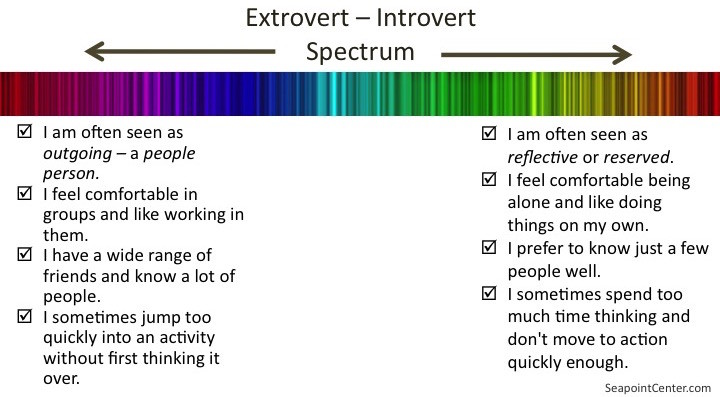What do these famous pairs have in common?
Lennon and McCartney
Burns and Allen
Jobs and Wozniak
Lerner and Loewe
Siskel and Ebert
They are all dynamic duos: extrovert – introvert pairs who created something together that neither of them would have done on their own.
What’s their secret?
Too often extroverts complain to each other about their introverted peers.
- You never know what they’re thinking.
- They take too long to respond.
- They’re not good communicators.
And too often introverts quietly roll their eyes at their extroverted peers.
- They talk too much.
- They speak before they think.
- They’re not good communicators.
But it doesn’t have to be that way, as these famous pairs show us.
It’s a spectrum, not a box.
Where do you fall on the Extrovert – Introvert Spectrum? Are you closer to one of the ends or near the middle? You might be mixed. Some of your answers might indicate extroversion and others introversion. Introverts are not all the same. Nor are all extroverts.
We meet at the point of our similarities, and we grow from the point of our differences.
If you only surround yourself with people who are like you, you lose an opportunity for growth and greater creativity.
However, to access that opportunity, you need to find a point of connection to build from, some sense of shared goals, values or purpose.
The place to start is by knowing yourself – where you fall on the spectrum.
In what ways are you introverted or extroverted? What does that mean for you? What are your challenges? What habits tend to get you in trouble? How are you seen by others? Do your good intentions match their experience of you?
Then, set your judgments aside.
Not everyone is like you, and that’s a good thing. Those who are different add a dimension that those who are like you can’t add.
Consider the possibility that those who are different might see a solution you could not have found without them.
And confront your assumptions.
If you tend toward extroversion: Understand that people who like to be alone are not unhappy or antisocial. Learn more about what’s really going on for introverts.
If you tend toward introversion: Understand that people who like to be with lots of people are not necessarily superficial. Learn more about what’s really going on for extroverts.
Harness The Genius of Opposites
Jennifer Kahnweiler, bestselling author of The Introverted Leader and Quiet Influence, says the key is to stop emphasizing the differences and focus on approaches that move you toward results. According her latest research, dynamic duos are successful when they:
1. Accept the fact that they can’t change their own preference or each other’s.
2. Deeply respect each other.
3. Understand and appreciate each other’s style strengths and limitations so they bring out the best in each other.
4. Hang in there when they don’t agree and are willing to challenge each other.
5. Understand that they can’t do it without each other. Their differences are what makes them successful.

The Genius of Opposites provides an extraordinary guide to harnessing the power of differences. Well-researched and practical, it is an easy, fun read, and I guarantee you’ll learn something useful. If you enjoyed my post and would like to learn more about this topic, I highly recommend this book. It is available in bookstores and at Amazon starting this week.















Fascinating. On any of the behavior assessments (DiSC, MBTI,etc.) extroversion and introversion are the first differentiators. What I appreciate about this article as well as Jennifer’s book is the emphasis is on coming together to achieve results and allowing each polarity to be accepted. It is also situational in nature. As a facilitator, I hold back my extroverted tendencies. As a keynoter, introversion would keep me from connecting with the audience. Context and appropriateness need to be taken into account. But before that, comes self-awareness.
As always, a great post!
Great points, Eileen. Although our preferences are inherent in the temperament we are born with, when we have self-awareness, we develop emotional-intelligence and have more choices.
Great post Jesse. I’m an Ambivert, a little bit of both. What’s too bad is that some like to elevate one as better than the other. Your post helps better define the issue.
Timely too. The LeadWithGiants Tweetchat coming up Monday is on the topic: Introvert VS Extrovert Leader. I hope you can make it and share your wisdom there.
Thanks for weighing in, Dan. The term “ambivert” is relatively new and I think to some extent reflects acquired social-intelligence.
For those who are active on Twitter, the LeadWithGiants Tweetchat is one of the best. Mondays 7 pm ET. More info click here.
Thank you for the post Jesse!
My husband and I aren’t famous -but we are a pair that balances each other. Our marriage is a constant reminder that we can let our differences drive each other crazy or be sharpened and strengthened. I am so thankful for the balance that he brings to my life.
Thanks for sharing your own experience, Chery. A wonderful reminder that synergizing differences is ongoing work but the rewards are worth it.
Thanks for this great post. I most ofter point out these dynamics in my keynotes, trainings, and coaching. You’ve done a masterful job of creating value for those who only see conflict rather than value of diversity.
We need to learn to use our differences to accomplish something spectacular rather than let them divide us. Glad to hear you promote this view in your work. Thank you!
“We meet at the point of our similarities, and we grow from the point of our differences.” Some brilliant points here Jesse. I also agree that once we have self- awareness we can flex across the spectrum. Eileen’s examples illustrate this beautifully. Accepting the Alien as I call it only comes after we accept and embrace our ourselves. We then know that we can never change someone. Successful opposites do that beautifully. Thank you for recognizing my work and for sharing your perspective.
It’s truly my pleasure, Jennifer. Love your work!
Thanks Jesse. I’m ordering Jennifer’s book for my son and his fiancé with the hope that they will be another fabulous, dynamic duo.
Great idea, Fay!
Thank you Fay! They are lucky to have your support:)